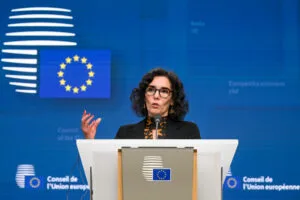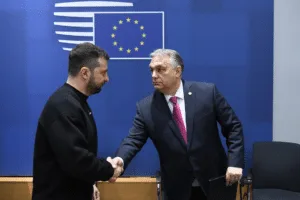Brussels – While European parties and politicians are absorbed in campaigning for the elections that will take place tomorrow through Sunday (June 6-9), behind the scenes in Brussels, these are intense days for the future of the Union. June will determine the timing and stages for the EU accession of two new countries, which are currently candidates and have received endorsement from the European Council to begin negotiations. Ukraine and Moldova await the outcome of the talks between the ambassadors of the twenty-seven countries to hope for a green light next June 25 at the General Affairs Council to adopt their respective negotiating frameworks. While there is a reticent (but not immovable) Hungary on one side, there are 12 governments on the other side that have decided to openly support the acceleration of negotiations with a letter sent to the Belgian rotating presidency of the EU Council.

“The opening of accession negotiations would give additional motivation” to both Kyiv and Chișinău, reads the text viewed by Eunews, which recalls the
“disastrous” situation in Ukraine and the “upcoming” presidential election and EU referendum in Moldova. Ministers from Estonia, Finland, Germany, Latvia, Lithuania, Poland, Portugal, the Czech Republic, Romania, Slovakia, Slovenia, and Sweden are convinced that “This would boost morale and promote work on reforms in these countries.” The request to the Belgian Foreign Minister and Council rotating President, Hadja Lahbib—whose work to advance the enlargement process under her leadership since January 1 is “highly appreciated”—is to adopt the negotiating frameworks at the General Affairs Council “at the latest in June”, with the goal of convening the first intergovernmental conferences “by the end of June 2024.”
The date marked on the calendar is June 25, when the 27 ministers will meet to decide (unanimously) on the go-ahead for intergovernmental conferences with candidates for accession to the Union. “In light of the achievements and ongoing reform efforts,” the letter further reads, “we believe that the time has come to move forward,” also pushing for “gradual integration into individual EU policies and programs prior to full membership” in the Union. The starting point is the conclusions of the March European Council when the heads of state and government called on the 27 ministers of European affairs to “rapidly adopt” the negotiating framework drafts and “take the process forward without delay”. The President of the European Council, Charles Michel, had confessed then that the hope was to “arrive at the first intergovernmental conference under the Belgian presidency” before the handover to Hungary for the six-month leadership of the EU institution (which sets calendars and agenda items for meetings of ministers in the different Council compositions).

This is precisely the crux of the 20 days until the General Affairs Council meeting. After the failure to reach an agreement at the Committee of Permanent Representatives (COREPER) last Wednesday (May 29) due to the Hungarian objections to Ukraine, the issue will return to the table of the ambassadors of the twenty-seven countries on Friday (June 7). “If the negotiating frameworks are agreed by that date, the presidency plans to hold the intergovernmental conferences for Ukraine and Moldova after the General Affairs Council,” EU sources confirmed at today’s (June 5) meeting where the partial agenda for the June 25 ministers’ meeting was set. Currently, reservations have been lifted from all member countries except Budapest on minority rights in Ukraine, trade, anti-corruption, agriculture, operation of the Single Market and good neighbourly relations.
The hope is that the government of Viktor Orbán will be interested in wrapping up the issue of Ukraine’s accession talks before it assumes the rotating presidency of the EU Council from July 1 to avoid having its six-month term punctuated by pressure and controversy in this regard (and given the fact that this is not the last opportunity for Hungary to use its veto power to block Kyiv’s EU membership). After the candidate country status was granted in June 2022 and despite the steady progress recorded by the European Commission over the following year and a half, the Hungarian premier chose the obstructionism route to try to prevent the green light for accession negotiations with Kyiv. Only through constant pressure from the EU institutions—and the unblocking of about €10 frozen billion by the Commission in Budapest—did Orbán make a rather unusual and striking gesture at the December 14, 2023, European Council: he left the room at the time of the vote so that the other 26 EU leaders could approve the most eagerly awaited of the summit conclusions.
How the EU accession process works
The EU enlargement process begins with a non-EU state submitting a formal application for membership to the rotating presidency of the Council of the European Union. Union membership first requires a successful examination of the Copenhagen criteria (established at the European Council in the Danish capital in 1993 and strengthened by the EU leaders’ meeting in Madrid two years later). These criteria are divided into three groups of basic requests that the Union addresses to the country that has applied for membership: rule of law and democratic institutions (including respect for human rights and the protection of minorities), stable market economy (ability to cope with market forces and competitive pressure), and fulfilment of its obligations (effectively implementing the body of EU law and meeting the objectives of political, economic and monetary Union).
Having obtained the favourable opinion of the Commission, it comes to the conferment of candidate country status with the approval of all members of the Union. This is followed by the Commission’s recommendation to the EU Council to open negotiations, which, again, requires the unanimous go-ahead of the member countries: this allows the negotiating chapters (varying in number) to be opened, the purpose of which is to prepare the candidate, particularly on the implementation of the necessary judicial, administrative, and economic reforms. When the negotiations are completed, and the EU enlargement is possible in terms of absorption capacity, this leads to the signing of the Accession Treaty (with terms and conditions for accession, including any safeguard clauses and transitional provisions), which must first be approved unanimously by the European Parliament and the Council.
Where does EU enlargement stand
The upheaval in EU enlargement began four days after the Russian armed aggression when, amid the war, Ukraine applied for “immediate” membership in the Union, with the application signed on February 28, 2022, by President Zelensky. Demonstrating the irreversibility of a process of rapprochement with Brussels as a clear reaction to the risk of seeing its independence from Moscow erased, three days later (March 3), Georgia and Moldova also decided to take the same path. The European Council of June 23, 2022, approved the line drawn by the Commission in its recommendation: Kyiv and Chișinău became the sixth and seventh candidates for EU membership, while Tbilisi was recognized as having a European perspective in the EU enlargement process. In the EU Enlargement Package 2023, the Commission recommended that the Council open accession negotiations with Ukraine and Moldova and grant Georgia candidate status. The December EU leaders’ summit accepted all requests, and now only the formal start of negotiations and adoption of negotiating frameworks for the first two is awaited. 
Of the six Western Balkan countries that have begun the long road to EU membership, four have already started accession negotiations (Albania, North Macedonia, Montenegro, and Serbia), one has received candidate status (Bosnia and Herzegovina), and the last, Kosovo, has formally applied for and is awaiting the response of the twenty-seven countries. For Albania and North Macedonia, negotiations began in July last year after waiting eight and 17 years, respectively, while Montenegro and Serbia have been at this stage for 12 and 10 years, respectively. After six years of applying for EU membership, Bosnia and Herzegovina became a candidate on December 15, 2022, also to join the Union and at the European Council on March 21, received the endorsement to formally start accession negotiations. Kosovo is in the most complicated position since the formal request sent in late 2022: since its unilateral declaration of independence from Belgrade in 2008, five EU member states (Cyprus, Greece, Romania, Spain, and Slovakia) continue not to recognize it as a sovereign state.
On the other hand, negotiations for Turkey‘s accession to the European Union were launched in 2005 but have been frozen since 2018 due to backward steps on democracy, rule of law, fundamental rights, and independence of the judiciary. In the chapter on Turkey in the latest annual Enlargement Package presented in October 2022, it was put in black and white that it “does not reverse course and continues to move away from EU positions on the rule of law, increasing tensions over border respect in the Eastern Mediterranean.” At the NATO summit in Vilnius at the end of June, the Turkish president, Recep Tayyip Erdoğan, tried to force his hand, threatening that he would only bind Sweden’s membership in the Atlantic Alliance to Brussels’ opening Turkey’s path back to the EU. The blackmail failed, but the dossier on Ankara was addressed at a strategic report special meeting in Brussels.
Find more insights on the Balkan region in the newsletter BarBalcani hosted by Eunews
English version by the Translation Service of Withub









